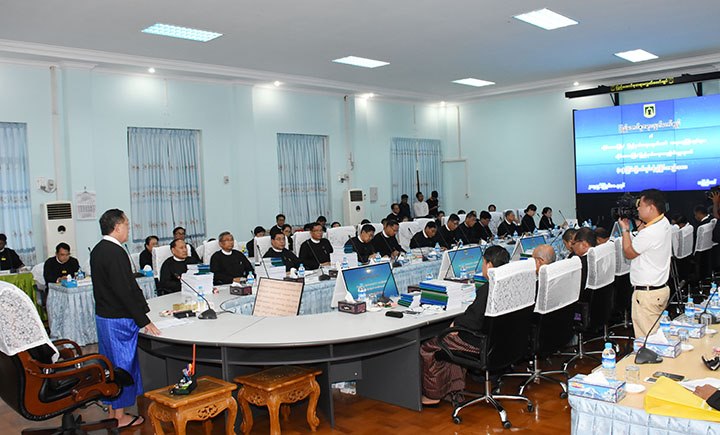09 August
The Union Supreme Court and State/Regional High Courts held their 17th coordination meeting in Nay Pyi Taw yesterday.
First, Chief Justice U Htun Htun Oo delivered the opening address. He said that during the judicial reform process, the courts of law must ensure quality justice on every person.
He said there must be objectives to generate greater public trust on the courts, deliver effective rule of law, pass free and fair judgement, be punctual and other standards the courts must uphold.
The Chief Justice told the judges that they must be extremely careful of their conduct as they are the pinnacles the people look to for level-headed judgement and proper exercise of justice. He added that they are working hard to open a judicial college in Nay Pyi Taw.
Next, the Chief Justice gave an account of the status of criminal and civil cases and writ petitions from the Supreme Court down to the township courts and other special courts.
From 1 January to 30 June this year, the Supreme Court has accepted 1,152 criminal and 1,421 civil cases and 214 writ petitions of which 1,094 criminal, 1,712 (including 291 cases from the past year), and 167 writ petitions were fully examined.
Similarly, the State/Regional courts have accepted 4,232 criminal and 3,236 civil cases of which 3,782 criminal and 2,525 civil cases were fully examined.
District courts have accepted 11,294 criminal and 7,822 civil cases of which 10,906 criminal and 5,547 civil cases were fully examined.
Township courts have accepted 228,442 criminal and 17,058 civil cases of which 222,418 criminal and 12,517 civil cases were fully examined.
Juvenile courts of Yangon and Mandalay have accepted 121 cases and fully examined 117. Municipal courts of Nay Pyi Taw, Yangon and Mandalay have accepted 4,739 cases and fully decided on 4,746 (including 7 from previous year). Traffic courts of Nay Pyi Taw, Yangon and Mandalay have accepted and fully examined 54,746 cases.
The Chief Justice said they began implementing the case management system in 74 state/regional courts. He said statistics in June this year showed that while these courts had good rates of completing course examinations, other courts still had high rates of court delays.
The Chief Justice said they began the trial programme of letting courts take the lead of civil cases in two district courts and two township courts over a period of five months, starting from 1 March 2019. He said they had successfully resolved 76 civil cases during that time.
The Chief Justice said they have outfitted four district courts with special witness interrogation rooms and other necessary equipment to question juveniles and adults in need of protection.
Attending the coordination meeting were the judges of the Supreme Court, chief justices of region/state high courts and other officials related to the legal field. The meeting continues today.—MNA (Translated by Zaw Htet Oo)


